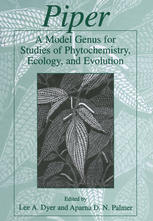

Most ebook files are in PDF format, so you can easily read them using various software such as Foxit Reader or directly on the Google Chrome browser.
Some ebook files are released by publishers in other formats such as .awz, .mobi, .epub, .fb2, etc. You may need to install specific software to read these formats on mobile/PC, such as Calibre.
Please read the tutorial at this link: https://ebookbell.com/faq
We offer FREE conversion to the popular formats you request; however, this may take some time. Therefore, right after payment, please email us, and we will try to provide the service as quickly as possible.
For some exceptional file formats or broken links (if any), please refrain from opening any disputes. Instead, email us first, and we will try to assist within a maximum of 6 hours.
EbookBell Team

5.0
30 reviewsPiper is an economically and ecologically important genus of plant that includes a fascinating array of species for studying natural history, natural products chemistry, community ecology, and evolutionary biology. The diversification of this taxon is unique and of great importance in understanding the evolution of plants.
The diversity and ecological relevance of this genus makes it an obvious candidate for ecological and evolutionary studies, but surprisingly, most research onPiper spp. to-date has focused on the more economically important plants P. nigrum (black pepper), P. methysticum (kava), and P. betle (betel leaf). While this book does address the applied techniques of studying Piper, its focus is more onPiper in its natural setting. Piper: A Model Genus for Studies of Phytochemistry, Ecology, and Evolution synthesizes existing data and provides an outline for future investigations of the chemistry, ecology, and evolution of this taxon, while examining its key themes of Piper as a model genus for ecological and evolutionary studies, the important ecological roles ofPiper species in lowland wet forests, and the evolution of distinctive Piper attributes.
This volume has a place in the libraries of those studying or working in the fields of ecology, evolutionary biology, natural products chemistry, invasive species biology, pharmaceutics, and ethnobotany.